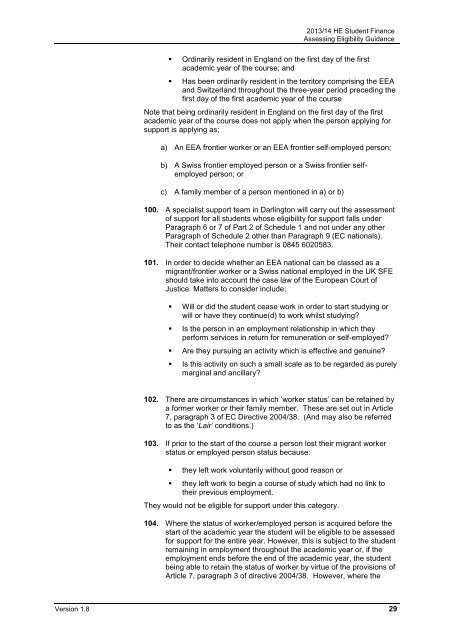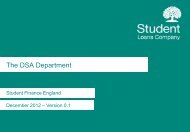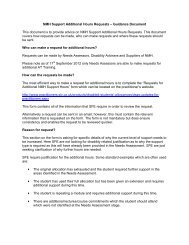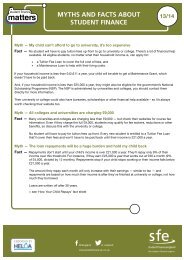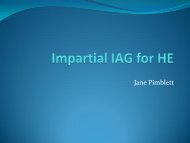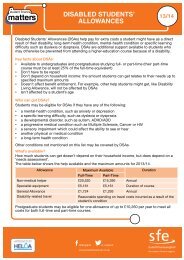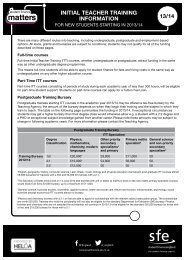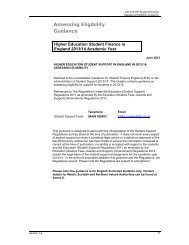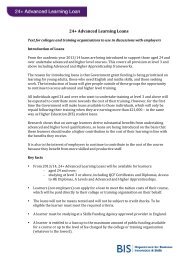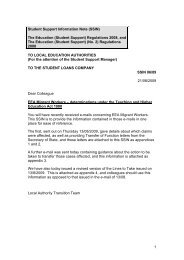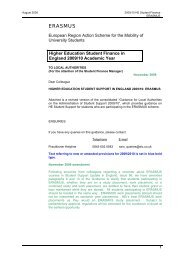SFE Assessing Eligibility Guidance 2013/14 - Practitioners - Student ...
SFE Assessing Eligibility Guidance 2013/14 - Practitioners - Student ...
SFE Assessing Eligibility Guidance 2013/14 - Practitioners - Student ...
Create successful ePaper yourself
Turn your PDF publications into a flip-book with our unique Google optimized e-Paper software.
<strong>2013</strong>/<strong>14</strong> HE <strong>Student</strong> Finance<br />
<strong>Assessing</strong> <strong>Eligibility</strong> <strong>Guidance</strong><br />
• Ordinarily resident in England on the first day of the first<br />
academic year of the course; and<br />
• Has been ordinarily resident in the territory comprising the EEA<br />
and Switzerland throughout the three-year period preceding the<br />
first day of the first academic year of the course<br />
Note that being ordinarily resident in England on the first day of the first<br />
academic year of the course does not apply when the person applying for<br />
support is applying as;<br />
a) An EEA frontier worker or an EEA frontier self-employed person;<br />
b) A Swiss frontier employed person or a Swiss frontier selfemployed<br />
person; or<br />
c) A family member of a person mentioned in a) or b)<br />
100. A specialist support team in Darlington will carry out the assessment<br />
of support for all students whose eligibility for support falls under<br />
Paragraph 6 or 7 of Part 2 of Schedule 1 and not under any other<br />
Paragraph of Schedule 2 other than Paragraph 9 (EC nationals).<br />
Their contact telephone number is 0845 6020583.<br />
101. In order to decide whether an EEA national can be classed as a<br />
migrant/frontier worker or a Swiss national employed in the UK <strong>SFE</strong><br />
should take into account the case law of the European Court of<br />
Justice. Matters to consider include;<br />
• Will or did the student cease work in order to start studying or<br />
will or have they continue(d) to work whilst studying<br />
• Is the person in an employment relationship in which they<br />
perform services in return for remuneration or self-employed<br />
• Are they pursuing an activity which is effective and genuine<br />
• Is this activity on such a small scale as to be regarded as purely<br />
marginal and ancillary<br />
102. There are circumstances in which „worker status‟ can be retained by<br />
a former worker or their family member. These are set out in Article<br />
7, paragraph 3 of EC Directive 2004/38. (And may also be referred<br />
to as the „Lair’ conditions.)<br />
103. If prior to the start of the course a person lost their migrant worker<br />
status or employed person status because:<br />
• they left work voluntarily without good reason or<br />
• they left work to begin a course of study which had no link to<br />
their previous employment.<br />
They would not be eligible for support under this category.<br />
104. Where the status of worker/employed person is acquired before the<br />
start of the academic year the student will be eligible to be assessed<br />
for support for the entire year. However, this is subject to the student<br />
remaining in employment throughout the academic year or, if the<br />
employment ends before the end of the academic year, the student<br />
being able to retain the status of worker by virtue of the provisions of<br />
Article 7, paragraph 3 of directive 2004/38. However, where the<br />
Version 1.8 29


